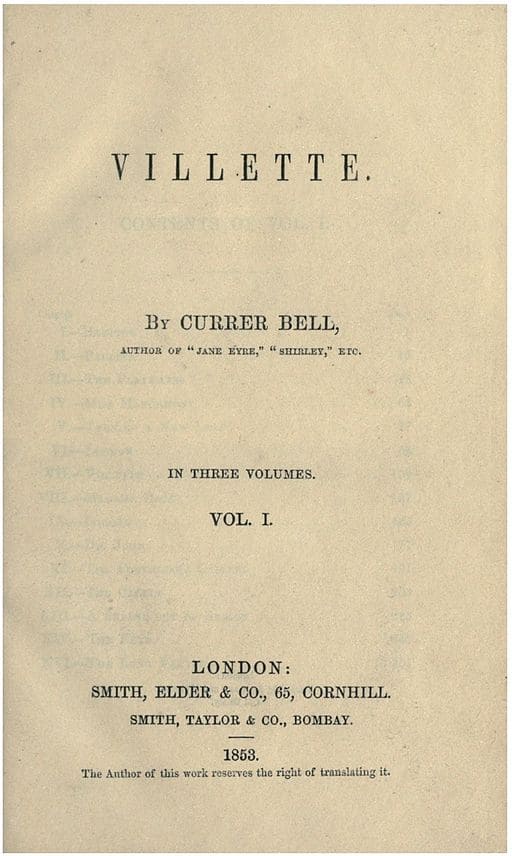Every now and then, English language students mention how they are confused by the difference between ‘such as’ and ‘as such’.
Are they the same? 🤔
No.
As I was reading through Charlotte Bronte’s psychologically deep novel, Villette, I realised some of its lines could help illustrate the difference between these two expressions. 📘
Villette (published in 1853) is the perfect novel to turn to for this Lesson. Charlotte Bronte not only used these two phrases or expressions in it, but the novel itself is full of multiple examples of things (which sometimes take ‘such as’) as well as having many references to people mentioned in the past (which often take ‘as such’).

Image Credit: Smith, Elder, and Co., Public domain, via Wikimedia Commons
📘 It is a story about a young and lonely English woman, Lucy Snowe, who travels to Belgium shortly after that country became an independent nation (c. 1840). While there, she works as an English teacher at an international girls’ school there and finds herself meeting new and fascinating Belgians as well as meeting some friends from her youth in England. All the same, her unique perspective and life history mean that it is hard for her to connect much with either community, even with her efforts to offer them her best.
For a time, she seems to exist on the outskirts of their lives, but gradually her position as an outsider helps her to reach out to others who are also living quiet but useful lives in Brussels. Through some of the people she meets, she uncovers the key to a wonderful mystery that has been puzzling so many, while at the same time also finding, even among the crowds, trustworthy and noble people she can call her own.
(If you are interested in reading some other Lessons I wrote on Villette, why not check out 👉 Lesson #207 in which we looked at English adjectives in Villette that end with either -ed or -ing).
Now back to our main topic of study today! 👇
…
📝 SUCH AS
‘Such as’ is used to introduce an example. ✍️
It can be substituted with ‘like’ in informal or spoken English. However, you should preferably write ‘such as’ when you are expressing yourself through more formal or written English.
✏️ ITS PLACEMENT IN THE SENTENCE AND PUNCTUATION RULES
Generally speaking, whenever the ‘such as’ clause functions as a non-restrictive clause, we insert two extra commas in the sentence – one before ‘such as’ and another after its examples.
✍️ A non-restrictive clause simply means a clause isn’t necessary to the sentence’s main meaning. Look at this sentence to understand what I mean:
📘 “Girls, such as me and Miss Snowe, don’t need treats, but he would like it.”
– Charlotte Bronte, Villette
Here ‘such as me and Miss Snowe’ is a non-restrictive clause because if we would remove it completely, the sentence would still have a meaning: ‘Girls … don’t need treats’.
Think of the two commas here as brackets. If the main sentence doesn’t really need the part of the sentence beginning with ‘such as X, Y, and Z’ to make sense, then ideally you should bracket it off – in other words, you need to place commas on either side of that clause in the sentence.
..
However, there are also restrictive clauses beginning with ‘such as’, and these do not need any comma before or after.
✍️ A restrictive clause refers to a clause that is necessary to the sentence’s complete meaning and so it cannot be neatly ‘bracketed off’ by commas.
Take this sentence for an example, where Lucy Snowe describes the emotions of a little girl called Paulina after her father has left her in the care of another family:
📘 ‘She went through, in that brief interval of her infant life, emotions such as some never feel …’
– Charlotte Bronte, Villette
Notice how the sentence’s main meaning is as follows: ‘She went through … emotions such as some never feel’.
The restrictive clause ‘such as some never feel’ is integral (central) to the sentence’s meaning because it explains the kinds of ‘emotions’ that little Paulina went through (experienced). For this reason – its centrality – it doesn’t need commas before or after.
On the other hand, if we took the liberty to rewrite the sentence in our own words and add a few more details, we could change the ‘such as clause’ into a non-restrictive one that requires bracketing commas on either side:
✒️ She experienced many emotions, such as sadness, loneliness, and occasional pleasure, in the few months she spent at Mrs Bretton’s house.
Hopefully, you are now able to see the difference between non-restrictive clauses (which require commas) and restrictive clauses (which don’t) whenever you see any sentence that includes a ‘such as …’ phrase.
…
📝 AS SUCH
This little phrase represents a noun that has already been mentioned. ✍️
📘 “Quite right; and you, I am told, are an English teacher in a foreign school here: my son recognised you as such.”
– Charlotte Bronte, Villette
In other words, the speaker is saying ‘you are an English teacher … and my son recognised you as [an English teacher].’
This example shows how ‘as such’ really reflects what was mentioned before without going through the trouble of specifically naming it again.
Whenever you see the phrase ‘as such’, you should be able to mentally substitute the previous noun in the place of the word ‘such’, as I just did in my example above.
✏️ ITS PLACEMENT IN THE SENTENCE AND PUNCTUATION RULES
Whenever we use the phrase ‘as such’, we almost invariably (without variation or change) insert a comma (,) or a period (.) right after it, depending on whether or not it is in the middle or at the end of a sentence.
You will see from these examples I have written that the placement of ‘as such’ in a sentence can be fairly flexible, as long as we pay attention to supplying the right punctuation after it:
✒️ Lucy Snowe was an orphan and a foreigner in Belgium. As such, she struggled to feel at home in the new school.
✒️ Lucy Snowe was a foreigner in Belgium, and as such, she struggled to feel at home in the new school.
✒️ Lucy Snowe was an orphan and a foreigner in Belgium; she struggled to feel at home in the new school as such.
…
📝 SUMMARY & CONCLUSION
To recap what we have covered here:
✔️ ‘Such as’ almost always introduces an example (or several), while ‘as such’ refers to a noun that has been mentioned previously.
✔️ Both of these are rather formal expressions and should be used when writing English. (As a side note, ‘such as’ is commonly used in English, whereas ‘as such’ tends to be used only in more specific situations.)
✔️ There are certain rules that apply to punctuation: usually, whenever a thought is unnecessary to the sentence’s main thought, it can be bracketed off by commas. Otherwise, we tend not to use many (or any) commas at all.
✔️ Because ‘such as’ introduces an example, it will always be placed somewhere in the middle of a sentence. On the other hand, ‘as such’ has very flexible placement rules and so it can appear at the beginning, in the middle of, or at the very end of a sentence.
Has this been helpful? I certainly hope so. I am always happy to answer any English language-related questions you have through my query form.
Lastly, here is the link once again to the Lesson I wrote on Villette and its assortment of adjectives ending with either -ed or -ing. It is worth a read! 📚




